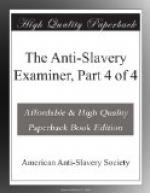The impediments to education already mentioned, necessarily render the acquisition of religious knowledge difficult, and in many instances impracticable. In the northern cities, the blacks have frequently churches of their own, but in the country they are too few, and too poor to build churches and maintain ministers. Of course they must remain destitute of public worship and religious instruction, unless they can enjoy these blessings in company with the whites. Now there is hardly a church in the United States, not exclusively appropriated to the blacks, in which one of their number owns a pew, or has a voice in the choice of a minister. There are usually, indeed, a few seats in a remote part of the church, set apart for their use, and in which no white person is ever seen. It is surely not surprising, under all the circumstances of the case, that these seats are rarely crowded.
Colored ministers are occasionally ordained in the different denominations, but they are kept at a distance by their white brethren in the ministry, and are very rarely permitted to enter their pulpits; and still more rarely, to sit at their tables, although acknowledged to be ambassadors of Christ. The distinction of caste is not forgotten, even in the celebration of the Lord’s Supper, and seldom are colored disciples permitted to eat and drink of the memorials of the Redeemer’s passion till after every white communicant has been served.
8. IMPEDIMENTS TO HONEST INDUSTRY.
In this country ignorance and poverty are almost inseparable companions; and it is surely not strange that those should be poor whom we compel to be ignorant. The liberal professions are virtually sealed against the blacks, if we except the church, and even in that admission is rendered difficult by the obstacles placed in their way in acquiring the requisite literary qualifications;[102] and when once admitted, their administrations are confined to their own color. Many of our most wealthy and influential citizens have commenced life as ignorant and as pennyless as any negro who loiters in our streets. Had their complexion been dark, notwithstanding their talents, industry, enterprize and probity, they would have continued ignorant and pennyless, because the paths to learning and to wealth, would then have been closed against them. There is a conspiracy, embracing all the departments of society, to keep the black man ignorant and poor. As a general rule, admitting few if any exceptions, the schools of literature and of science reject him—the counting house refuses to receive him as a bookkeeper, much more as a partner—no store admits him as a clerk—no shop as an apprentice. Here and there a black man may be found keeping a few trifles on a shelf for sale; and a few acquire, as if by stealth, the knowledge of some handicraft; but almost universally these people, both in town and country, are prevented by the customs of society from maintaining themselves and their families by any other than menial occupations.




